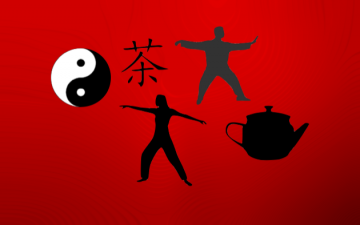
Without the excuse of “it’s Monday” and still so far away from Friday, Tuesdays are pretty painful. Everyone wants to go home by the time afternoon starts. Is it really worth the energy to stay awake for a tai chi presentation? A tea ceremony? Why should I care?
The two presentations were organized by the National Chinese Honor Society and the high school Chinese department with funding from the PTA. According to Ms. Wang, the head of modern languages department, this is the first year they’ve organized an event like this. Taichi and tea were chosen as representative aspects of Chinese culture, and the choice of tea ceremony is also linked to the curriculum of Mandarin A and Mandarin B courses (read Arete’s article about the tea ceremony here). Throughout our interview, Ms. Wang emphasized that the department hopes this event will “promote Chinese culture in school.”
This brings us to an interesting point: why is it important for us to understand Chinese culture? Junior student Rachel M. accurately explains that many people do not enjoy the events much, as they would rather go home early or get academic assistance during that time. However, as someone who has lived in Guangzhou since the age of three, Rachel also says that she “can relate to Chinese culture a lot more than the culture of [her] home country,” and believes that it is important to learn about it. Sophomore Chhavi K. also holds a similar viewpoint, believing that we should all know more about the culture of the country we currently live in. I agree with both of them. Although most of us will not be staying here in Guangzhou, China for a long time, we should at least make some effort to learn something about our host country.
Many of us learn best when we are on our feet, digging our hands into an interactive project. That may be part of the reason why students complain about the presentations. However, it is important to point out the Chinese department’s efforts to involve students and teachers in Chinese culture. For example, the annual sweet dumpling (汤圆) wrapping mini-event in the cafeteria is a great chance for AISG staff and students to experience Chinese culture with both hands and taste buds. As Chhavi points out, “we are fortunate to be at a school that gives us opportunities like this,” and should make the most of these cultural experiences. If tea and tai chi really don’t interest you, don’t limit yourself to what the presentations provide: go explore Guangzhou’s cuisine, architecture, language, history, calligraphy, or paintings at your own pace, with your own people!
Of course, meanwhile, it wouldn’t hurt to put a little effort into keeping your eyes open during the presentations, at least out of respect for the efforts of the Chinese department 🙂